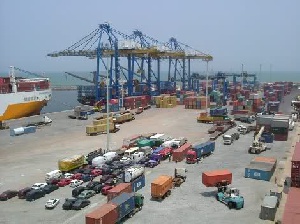An umbrella body for freighters and customs brokers operating in the country, Ghana Institute of Freight Forwarders (GIFF), has refuted claims of a deliberate attempt by its members to sabotage the paperless system of cargo clearance at the ports.
The paperless clearance process, which went live barely two weeks ago, has seen some technical hitches particularly at the compliance stage—where a customs official has to verify whether the applicable duties as quoted on the Customs Classification and Valuation Report (CCVR) has been paid by the shipper—before authorising the release or physical examination of the consignment.
The stalling of the process caused some clearing agents to protest what they viewed to be “inefficiencies” in the system for which deputy Finance Minister, Kweku Kwarteng, had to step in to calm the situation.
But the protest by the clearing agents was viewed by certain circles within the port community to be a deliberate attempt to frustrate an initiative that will better the lots of all stakeholders along the shipping value chain.
President of the institute, Kwabena Ofosu-Appiah, in defense of the allegations, told the B&FT: “We remain consistent with our position that should the paperless system fail, it won’t be because we, as freight forwarders and custom brokers, want it to fail.
But it will be because the systems which must carry our concerns to the authorities would have failed; and unfortunately that is what we are seeing.”
According to the GIFF boss, the technical hitch that has greeted the initial take-off of the paperless ports is an indication that “the system is not ready and we have to take another look at it.”
He added: “As stakeholders, we must find ways to deal with the problems that we have, these problems demand that we sit down and do serious introspection and get solutions to the problems that we have.”
Mr. Ofosu-Appiah buttressed his argument with a scenario where a freight forwarder has followed the electronic process thoroughly and has paid the applicable duties only to have his consignment still landed at the port for close to a week awaiting response from compliance.
“I mean this particular scenario is replete; it is all over the place in different shapes and forms. Sometimes you get through compliance and you are locked at GPHA because your declaration cannot be seen by any system down the stream, which is bad,” he noted.
At the core of the objectives for the introduction of the paperless goods clearance at the port was the need to facilitate the flow of goods as well as increase revenue maximisation.
The fear of freight forwarders is that if the hitches within the system are not fixed as soon as possible, government could get revenue from the port alright, but the other aspect of trade facilitation will suffer.
Mr. Ofosu-Appiah indicated: “In a situation like this, obviously, the government is laughing to the bank, then the other players downstream; the shipping lines and terminal terminal operators are all laughing to the bank because you have not been able to take your goods from their holding area for the last six days you’ve gone past the allowable days you have with them.
At the end of the day, the country suffers for it because all these goods we manage to get on the market, if the demand for these goods are inelastic, you and I are going to buy it at which ever cost.”
Business News of Wednesday, 13 September 2017
Source: thebftonline.com
Clearing agents not sabotaging paperless - GIFF boss
Entertainment












